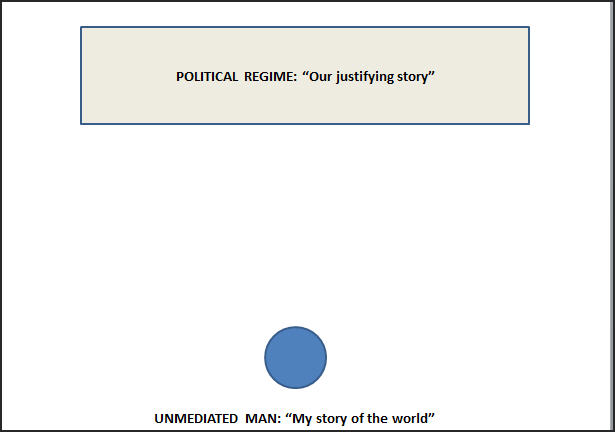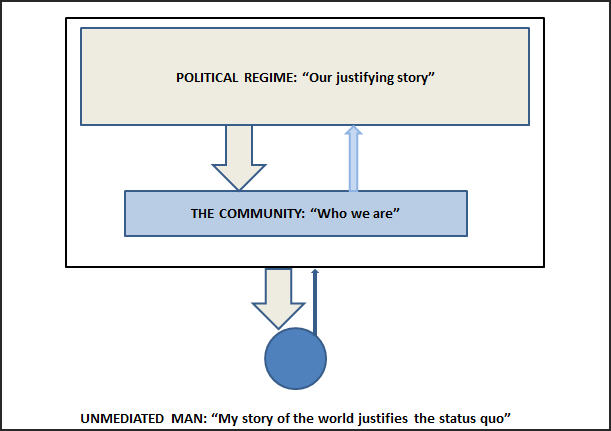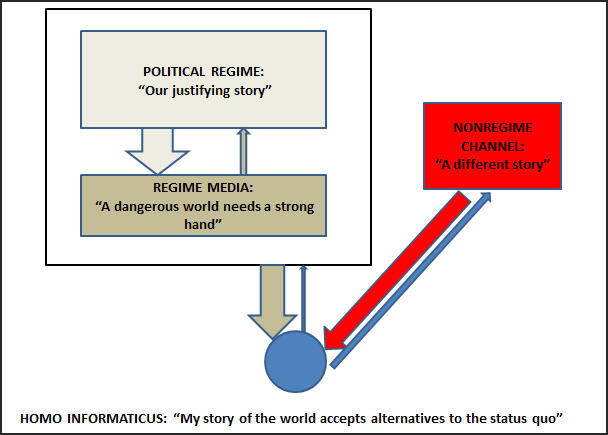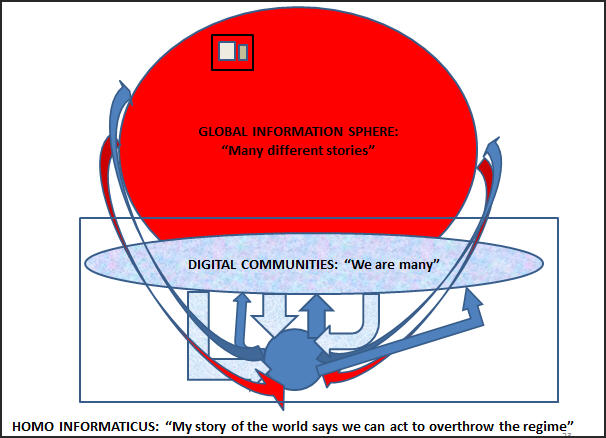The next stage in human evolution is already among us. This organism will never leave behind fossils or petrified footprints, because it dwells entirely in the digital universe. Despite the lack of powers vested in me, I have taken the bold step of naming him Homo informaticus: information man.
A question lies at the heart of Homo informaticus’ evolutionary story. The question is this: what influence, if any, does information have over political power? The answer isn’t intuitive. Information is an abstraction. Power is very real. Yet the wielders of power have always assumed a close and deep relationship to information. Governments work hard to manipulate the available channels of information, to make the story inside the heads of the public glorify, justify, or at a minimum tolerate the political status quo.
As the recent cases of Libya and Syria prove, no government can survive wholly on the basis of brute force. A significant portion of the public must find the status quo acceptable, and the larger the number of true believers, the more solid the foundation underneath a regime. Thus the potential influence of information over political power flows more from its fit into stories of legitimacy than from objective reporting or even practical knowledge.
To unpack the question, let’s begin with the predecessor of Homo informaticus: call him Unmediated Man.
As his name implies, Unmediated Man lacks access to any media. He’s likely to be illiterate. His only channels of information are the people around him. While he may sound like an implausible fiction, Unmediated Man describes the typical Egyptian of 1980, and represents most people’s relationship to information from the dawn of our species until very recently.
The problem for an authoritarian regime with great, but not infinite, power to control information is how to communicate and interact with Unmediated Man in ways favorable to its justifying stories.
 In reality, of course, all information is mediated. The question is whether mediation is conducted directly, face to face, or indirectly by print or electronic sources. Unmediated Man depends on his community for information: extended family, friends, neighbors, local religious and political authorities, bosses, underlings, co-workers, his butcher, his barber, “the street.” The single most important aspect of this information environment is that so very little is new. The range of interests is narrow, the set of sources small. Unmediated Man wakes up every morning expecting a world quite unchanged from the day before.
In reality, of course, all information is mediated. The question is whether mediation is conducted directly, face to face, or indirectly by print or electronic sources. Unmediated Man depends on his community for information: extended family, friends, neighbors, local religious and political authorities, bosses, underlings, co-workers, his butcher, his barber, “the street.” The single most important aspect of this information environment is that so very little is new. The range of interests is narrow, the set of sources small. Unmediated Man wakes up every morning expecting a world quite unchanged from the day before.
So for the regime to communicate and interact with Unmediated Man in terms advantageous to its story of legitimacy, it need only control the community – which, of course, it does in many ways. The regime appoints the local authorities, including the political headmen, police, military, tax and land assessors, business license granters, health inspectors, census takers, teachers, etc. Everyone coming in contact with Unmediated Man knows his version of the regime’s story of legitimacy – and those who fail to do so egregiously enough are removed and silenced.
 All things being equal, Unmediated Man lacks the means to conceive of an alternative story to the one which justifies his present way of life. He may protest, even violently, against local conditions, but will never seek to overthrow the political system.
All things being equal, Unmediated Man lacks the means to conceive of an alternative story to the one which justifies his present way of life. He may protest, even violently, against local conditions, but will never seek to overthrow the political system.
Feedback from below is extremely narrow under such constraints. Probably nothing of Unmediated Man’s private fears and frustrations reaches the ear of the government. This means the government can (and in fact must) behave as if the public didn’t exist.
 Now the regime must communicate and interact with a differently endowed member of the public. Our newly evolved hominid, Homo informaticus, is literate and has access to newspapers, radio, TV. He’s exposed to a larger world beyond the immediate community.
Now the regime must communicate and interact with a differently endowed member of the public. Our newly evolved hominid, Homo informaticus, is literate and has access to newspapers, radio, TV. He’s exposed to a larger world beyond the immediate community.
His arrival confronts the regime with a new threat: the public with a longer reach may gain access to information which subverts its story of legitimacy. In the regime’s worst nightmare, the public actually conceives of an alternative form of government and acts to attain it.
To cover this threat, the regime must deploy a costly and elaborate state media apparatus. It acts vigorously to own, or at least control, the means of mass communication: newspapers, radio, TV, books, cinema, etc. The content of state media plays, in harmony, theme and variations of the regime’s justifying stories.
The ideal for the regime would be to reconstruct, in the controlled media, voices similar to those of the local community through which it dealt with Unmediated Man. In many ways, the structure of mass media fits smoothly into regime schemes of control: it is top-down, one-to-many, monopolistic, and demands a passive, undifferentiated mass audience.
However, sheer volume makes the reconstruction of the small world impossible. Even in the most controlled media, the amount of information is far greater than what was available in Unmediated Man’s village. Too much of the content is new and unsettling, too much covers distant and alien conditions. As messages and images proliferate, it becomes progressively harder to determine exactly what their relationship is to the regime’s justifying story. As more intermediaries are used, it becomes progressively more likely that dissonance will be introduced into the information stream.
 The simplicity and perfect fit between the public’s perception of the world and the regime’s story of legitimacy are gone forever. Under these conditions, the best outcome for the regime is acceptance by the public that the world is too complex to be understood yet too dangerous to be left alone, and must be placed in the care of those whose job it is to manage the nation’s affairs. Examples of mediated acceptance of the political status quo are the Soviet Union under Stalin and North Korea today.
The simplicity and perfect fit between the public’s perception of the world and the regime’s story of legitimacy are gone forever. Under these conditions, the best outcome for the regime is acceptance by the public that the world is too complex to be understood yet too dangerous to be left alone, and must be placed in the care of those whose job it is to manage the nation’s affairs. Examples of mediated acceptance of the political status quo are the Soviet Union under Stalin and North Korea today.
By its structure and composition, mass media allows an even narrower feedback path than did the local community of Unmediated Man: the presence of mediators increases the distance between those at the top of the power structure and everyone else.
The decisive transformation of H. informaticus’ mental universe arrives with the introduction of independent channels of information. A single such channel – a privately-owned newspaper, say, or a satellite TV station like Al Jazeera – can work a prodigious change in the public’s perception of the world.
Information can influence actions by means of demonstration effects. It shows something hitherto not known or believed to be possible: a new and improved dishwater detergent is a trivial example. This is why mere volume of information is subversive of any narrative: alternatives are demonstrated. State-controlled media generated too much information, too much that was new, but when effective it convinced H. informaticus that no safe alternatives existed to the present state of affairs.
By necessity, an independent channel will deliver demonstration effects contradicting the regime’s justifying story with equally plausible explanations.
When judging his government, H. informaticus can then do so in light of alternative possibilities – different views of the same policy or event, different values invoked for an action or inaction, different performance by other governments, real or imagined. The first step toward skepticism is doubt, and H. informaticus, exposed to an independent channel, must confront choices and doubts when constructing his story of the world.
 As this evolutionary story approaches the present moment, content proliferates. A vast global information sphere, churning with controversies, points of view, and rival claims on every subject, becomes available to our hero. Its volume and variety exceeds that of the controlled media by many levels of magnitude.
As this evolutionary story approaches the present moment, content proliferates. A vast global information sphere, churning with controversies, points of view, and rival claims on every subject, becomes available to our hero. Its volume and variety exceeds that of the controlled media by many levels of magnitude.
If H. informaticus were to try to absorb this mass, his head would explode. This is not what transpires. He will pick and choose. So will other members of the public. By that very selectivity, that freedom to choose its channels of information, the public breaks the power of the mediator class created by mass media and, under authoritarian rule, controlled by the regime.
The fall of the mediators, all things being equal, means the end of the regime’s ability to rule by persuasion.
Governments of every stripe have had trouble grasping the sudden reversal in the information balance of power. Proud in hierarchy and accreditation, but deprived of feedback channels, the regime is literally blind to much global content. It behaves as if nothing has changed except for attempts by alien ideals – pornography, irreligion, Americanization – to seduce the public. It believes controlled media still sets the agenda and the frames for public discussion. Most significantly, the regime in its blindness fails to adjust its story of legitimacy to make it plausible in a crowded, fiercely competitive environment.
 An accurate visual representation based on volume, however, would show state-controlled media to be microscopic, invisible, when compared to the global information sphere. This is how H. informaticus experiences the changed environment: as an Amazonian flood of irreverent, controversy-ridden, anti-authority content, including direct criticism of the regime.
An accurate visual representation based on volume, however, would show state-controlled media to be microscopic, invisible, when compared to the global information sphere. This is how H. informaticus experiences the changed environment: as an Amazonian flood of irreverent, controversy-ridden, anti-authority content, including direct criticism of the regime.
The consequences are predictable and irreversible. The regime accumulates pain points: police brutality, economic mismanagement, foreign policy failures, botched responses to disasters. These problems can no longer be concealed or explained away. Instead, they are seized on by the newly empowered public, and placed front and center in open discussions. In essence, government failure now sets the agenda.
As the regime’s story of legitimacy becomes less and less persuasive, Homo informaticus adjusts his story of the world in opposition to that of the regime. He joins the ranks of similarly disaffected members of the public, who are hostile to the status quo, eager to pick fights with authority, and seek the means to broadcast their opinions and turn the tables on their rulers.
The means of communication are of course provided by the information sphere. The unit of broadcasting can be a single individual: any member of the public, including H. informaticus. The level of reach is billions, distributed across the face of the world.
 At this stage, the public, clustered around networked communities of interest, has effectively taken control of the means of communications. The networked communities revolve around favorite themes and channels, which in the aggregate reveal the true interests of the public (as opposed to what mass media, corporations, or governments wish the public to be interested in).
At this stage, the public, clustered around networked communities of interest, has effectively taken control of the means of communications. The networked communities revolve around favorite themes and channels, which in the aggregate reveal the true interests of the public (as opposed to what mass media, corporations, or governments wish the public to be interested in).
In a relatively free society, the public will be fragmented among communities obsessed with cute kittens, computer games, sports and entertainment stars, political news, etc. Under authoritarian governments similar communities arise, but will tend to coalesce in political opposition as they bump against regime surveillance and control. (This is the back story to Ethan Zuckerman’s “cute cat theory” of online activism.)
The regime still commands the apparatus of repression. It can deny service, physically attack, imprison, or even kill H. informaticus – but it can’t silence his message, because this message is constantly amplified and proliferated by the opposition community. Since the opposition commands the means of communication and is embedded in the global information sphere, its voice carries beyond the reach of any national government.
This was the situation in Egypt before the fall of Mubarak. This is the situation in China today. The wealth and brute strength of the modern state are counterbalanced by the vast communicative powers of the public. Filters are placed on web access, police agents monitor suspect websites, foreign newscasters are blocked, domestic bloggers are harassed and thrown in jail – but every incident which tears away at the legitimacy of the regime is seized on by a rebellious public, and is then broadcast and magnified until criticism goes viral.
The tug of war pits power against persuasion, hierarchy against network, government against the governed: under such conditions of alienation, every inch of political space is contested, and turbulence becomes a permanent feature of political life.
The rise of Homo informaticus has meant the demise of legitimacy for many forms of political authority. Will this make a global “revolution 2.0” inevitable? Given the number of interlocking variables in play, inevitability appears less likely than a radical uncertainty.
The nature of the political system matters. Spain’s young, well-educated indignados are drawn from the same demographic that filled Tahrir Square in Cairo, but are less likely, in a democratic system, to engage in desperate actions.
Objective conditions matter. The ruling class in China lacks legitimacy but its reputation for growing the economy is the diametric opposite of the late Mubarak regime’s.
The sheer viciousness of the regime matters. It was safer to protest against Ben Ali in Tunisia and Mubarak in Egypt than against Qaddafi in Libya and Assad in Syria – or, for that matter, the Kim dynasty in North Korea.
But the rise of H. informaticus places governments on a razor’s edge, where any mistake, any untoward event, can draw a networked public into the streets, calling for blood. This is the situation today for authoritarian regimes and liberal democracies alike. The crisis is about loss of trust in government, writ large. The mass extinction of stories of legitimacy leaves no margin for error, no residual store of public good will. Any spark can blow up the established political system at any moment, anywhere.
Our original question asked how something as abstract as information could influence something as real as political power. I think we can now offer up a tentative set of answers.
1. Information influences politics because it is indigestible by a government’s justifying story.
2. The greater the diffusion of information to the public, the more illegitimate any political status quo will appear.
3. Homo informaticus, networked builder and wielder of the global information sphere, poses an existential challenge to the legitimacy of every government he encounters.
4. H. informaticus’ command of the means of communications gives him the capacity to mobilize large numbers against governments and policies he perceives as illegitimate.
This (I repeat) represents a great strategic reversal, in which the power to set the issue agenda and determine an issue’s moral and emotional frames – in other words, the power of persuasion – has flipped from governments to a restless public.

Pingback: Fanboy Politics and Information as Rhetoric | Adam Gurri
Pingback: The Revolt of the Public – DeFi News